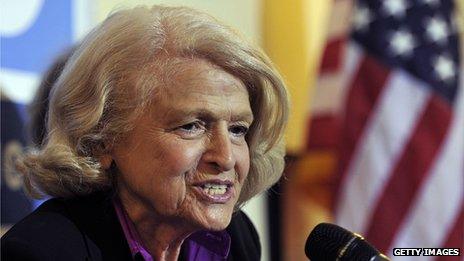States deal with gay marriage aftermath
- Published

The Supreme Court ruled in June that Edie Windsor should not have had to pay tax on property she inherited after her wife's death
In June, the Supreme Court issued two rulings favourable to marriage equity for gay couples. Now, US states must work through the consequences of those rulings.
For US gay rights advocates, it's been a good summer.
In June the Supreme Court allowed for federal recognition of same-sex marriages in states where such unions are legal. They also declined to challenge a lower court decision invalidating California's ban on same-sex marriage.
But the fight for marriage equity is far from over. In the aftermath of the court decisions, battles have raged on a state level as advocates for gay marriage try to push ahead, while those who oppose it try to stand their ground.
"Thirty-seven states still have marriage restrictions, but there's no question that it feels different this time," says Jennifer Pizer, director of the law and legal project at Lambda Legal, a gay rights organisation.
"This is happening with a much bigger head of steam and a much stronger sense that while there's much more work to be done, it's just a matter of getting it done."
Signs of hope
Much of that work is being done in the courtroom.
In Virginia, Lambda Legal is pairing with the American Civil Liberties Union to challenge the state's ban on gay marriage, while a couple in Kentucky has filed suit against their state's ban. A couple in Oklahoma did the same, citing the Supreme Court decisions.
Other activists are working through the legislative system. In Oregon, which banned same-sex marriage in 2004, gay marriage supporters are working to have the ban reconsidered through a 2014 ballot initiative.
"There are efforts in some states to put repeal measures on the ballots, and discussions in state legislatures to allow voters to remove some of the amendments" banning gay marriage, says Ms Pizer.
There have been signs of hope for those who favour same-sex marriage rights.
A couple who married in Maryland, where gay marriage is legal, appealed to a federal judge to have their union recognised in their home state, Ohio, despite that state's gay marriage ban.
The judge agreed, ruling that the marriage should be recognised on the death certificate of John Arthur, who is ill and expects to die soon.
A 'crafty' decision
Not doing so, the judge ruled, would result in grievous harm to Mr Arthur's spouse, Jim Obergefell. The judge noted that while his decision was limited to that couple, the state's law denied to same-sex couples the "dignity and recognition" afforded to heterosexual ones.
These challenges, says John Aravosis, who runs the website AmericaBlog, will become more frequent in the wake of the Supreme Court case United States v Windsor.
In that case, the Supreme Court ruled Edie Windsor should not have had to pay tax on property she inherited after her wife's death. She would not be subject to such tax had she married a man.
The ruling stated that the federal government needed to recognise marriages performed in states where same-sex marriage is legal.
"Looking at the decision, it almost is a very crafty way of legalising gay marriage," Mr Aravosis says. "It didn't legalise it nationwide, but the way they wrote it sounds like they are trying to say 'good luck not recognising it'.
"In a way the court helped us, but it is still requiring us to go state-by-state through the process."
To that end, some are testing the limits of the law and the new judicial tolerance for gay marriage in other ways.
'Untenable'
In Pennsylvania, for instance, a local official has begun issuing marriage licences to same-sex couples despite such marriages being illegal in the state. Montgomery County Register of Wills D Bruce Hanes says the state's constitution guaranteed gay residents of Pennsylvania equal protection under the law.
"When a statute is in opposition to the constitution, I'm going to follow the constitution," Mr Hanes said on the Rachel Maddow Show, external.
Since then, Mr Hanes has been sued by the state's department of health, which demands he cease issuing licences. But Pennsylvania's attorney general says she will not defend the state's gay marriage ban in court.
In Cincinnati, home of Mr Arthur and Mr Obergefell, the city's solicitor also declined to defend the state's same-sex marriage ban.
For those who oppose gay marriage, these decisions by state officials represent a dangerous encroachment.
"It's not a case of overstepping their bounds," says Chris Plante, a regional director for the National Organization for Marriage. "It's a case of lawlessness."
It is neither appropriate nor tenable for state officials to disregard laws on the books based on their own personal beliefs, he says.
"It's not your job to be on the 'right side of history'," he says. "Your job is to be on the right side of the law."